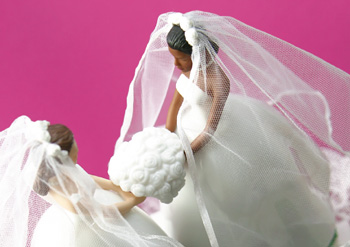![[Metroactive News&Issues]](/gifs/news468.gif)
[ Santa Cruz Week | SantaCruz Home | Archives ]
Till Government Do Us Part
Santa Cruz's Linda Robinson and her partner were celebrating 13 years together when the California Supreme Court nullified their marriage. Now they fear domestic partner rights will be taken away.
By Leyna Krow
Thirty years ago it would have been amazing to think that people might sit around the dinner table and discuss the possibility of two men getting married. So that's a sign of progress, if nothing else."
That's the perspective of Diversity Center communications director Bob Correa, who suggests that if you want to know how far same-sex couples in California have come in the fight for the right to marry, just look back a few decades. The difference is stunning.
But for those who came so close to nuptial equality in February 2004--when San Francisco Mayor Gavin Newsom began issuing marriage licenses to same-sex couples only to have those marriages annulled by the California Supreme Court--it can be hard to remain optimistic.
Local resident Linda Robinson and her partner were married on Feb. 16, 2004, at City Hall in San Francisco.
"We waited in line in the rain for seven hours. The line wrapped all the way around city hall. Everyone was so excited and so supportive," Robinson said of the experience.
Three and a half weeks later, while in Hawaii celebrating their 13th anniversary, Robinson and her partner learned that their marriage, along with almost 4,000 others, had been nullified.
"My partner and I had talked about it and we knew it was primarily a political statement, but of course we were hoping the marriage would stick. To back up what little rights we've gained feels like a huge blow."
Another potentially huge blow is Section 1.1 of the Voter's Right to Protect Marriage Initiative, which states, "Only marriage between one man and one woman is valid or recognized in California, whether contracted in this state or elsewhere."
This initiative to amend the California constitution has been recently renamed the Invalidation of Domestic Partnership Rights Initiative, which is precisely what it would do. The measure would void the rights currently allowed to couples registered as domestic partners including (but not limited to) health-care benefits, child custody, hospital visitation and health-care decisions for an incapacitated partner. For those who have built families and livelihoods around domestic partnerships, this can be a frightening prospect.
Supporters of the initiative originally hoped to have it on the ballot in June 2006, but failed to collect the required 600,000 signatures. Citing distractions such as November's special election and Hurricane Katrina for this failure, proponents at ProtectMarriage.com maintain this is an issue Californians are genuinely concerned about and will try again to collect enough signatures to qualify the initiative for the November 2006 ballot.
Marrie Schaller of the Santa Cruz GLBT Alliance insists, "Most people don't actually feel threatened by same-sex couples, but there is a small but very active group of folks who are very good at playing on people's anxieties and trying to connect those fears to same-sex couples."
Still, when the fight is for marriage, losing ground over domestic partnerships certainly seems like a backward step.
According to Correa, "I'm sure they'll get their signatures. It's not tremendously difficult to get an initiative on the ballot. That's what movements are like, you take a step forward, you take a step backwards, but it feels like we're on the right side of history."
Right or wrong, those who find themselves on Correa's side have an ally in Shannon Minter and the San Francisco�based National Center for Lesbian Rights (NCLR). Minter is lead counsel for Woo v. Lockyer, a case making its way to the California Supreme Court on behalf of 12 couples married in San Francisco in 2004. In April 2005, the San Francisco Superior Court ruled in favor of the couples, holding that the exclusion of same-sex couples from marriage is discriminatory and violates the fundamental rights guaranteed in the California constitution. If the decision is upheld, the option of legal and equal marriage will become a reality for same-sex couples in California.
"For the couples that married, they described it as being the happiest day of their lives," said Minter. "It brought them joy and peace of mind and gave them a chance to feel that they were treated equally for the first time. Then to have that taken away is painful on a level that's hard to imagine. It's my hope that the court will do the right thing and allow these couples the happiness they deserve."
Woo v. Lockyer is currently in the California Court of Appeals in San Francisco. On Jan. 9, 2006, over 250 religious and civil rights groups, including the NAACP, the California Women's Law Center and the California Council of Churches, filed amicus briefs with the Appeals Court to show their support for the case. The NCLR anticipates that the California Supreme Court will hear the case in the spring and hopes for a decision by the end of the year.
In the mean time, for thousands of couples across California, the wait continues.
"We still have our marriage certificate on our wall," said Robinson. "Whatever they say, we still have that piece of paper. In our hearts, we're married."
Copyright © 2006 Metro Publishing Inc. Maintained by Boulevards New Media.
For more information about Santa Cruz, visit santacruz.com.
![]()

The Wedding Cake Decoration That Dare Not Speak Its Name: Same sex cake ornaments such as this represent a clear threat to the sanctity of marriage.
From the January 25-February 1, 2006 issue of Metro Santa Cruz.